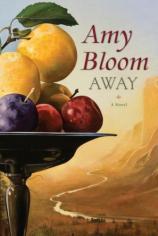Away
Review
Away
Amy Bloom is a psychotherapist by profession. In her second novel, a transcendent exploration of the power of maternal love, she brings to bear the novelist's imagination and the therapist's insight to produce a work of fiction that blends skillful storytelling with memorable characters to create a classic quest narrative.
AWAY is set in the rowdy world of America of the 1920s. Its protagonist, Lillian Leyb, is a young Jewish woman from Lithuania whose husband and parents have been slaughtered in a savage pogrom, the memory of which haunts her dreams. With Lillian's aid, her three-year-old daughter Sophie escapes execution. But when an aunt reports she has seen Sophie's body floating in the river, Lillian decides to abandon her village for life with a cousin in the crowded Jewish tenements of the Lower East Side of Manhattan.
Shortly after her arrival, Lillian finds a job as a seamstress in the prominent Yiddish theater run by Reuben Burstein and featuring his actor-son, Meyer. Soon, the Bursteins are competing for Lillian's affections in an odd sexual triangle while they help educate her about life in America.
But the new world into which Lillian has begun to settle is upended when her cousin Raisele arrives in the United States, claiming that Sophie was not killed in the pogrom, but instead has been adopted by another family from the village and spirited away to a nascent Jewish community in Siberia. Armed with this information and the faint glimmer of hope it inspires, Lillian is determined to return to Russia to find her daughter. In the words of a Yiddish proverb that serves as one of the novel's leitmotifs: Az me muz, ken men (When one must, one can).
Lillian decides to book passage on ship that will take her to Odessa, leaving a perilous 3,000-mile trek to Siberia where any possibility of finding Sophie is slim at best. Before she can do that, she yields to the even more preposterous suggestion of her friend and fellow Burstein compatriot, Yaakov Shimmelman --- "tailor, actor, playwright" --- that she head west across the United States and eventually make her way over the Bering Strait into Siberia.
The final two-thirds of the novel traces Lillian's harrowing and heroic journey to find Sophie. She travels by train from New York to Chicago and then on to Seattle, spending most of the trip in a dark and fetid broom closet. When she reaches the West Coast she is rescued from a beating by a prostitute named Gumdrop Brown, who eventually enlists Lillian in a scheme to exact revenge on Gumdrop's pimp, who has been skimming moneys owed her. That plan ends in catastrophe and Lillian flees to Canada, encountering Christian missionaries and spending time in a women's correctional institution along the way. When she's released she trudges on her solitary path through the wilderness of northern British Columbia, following a trail of abandoned telegraph stations, into the Yukon Territory, where she finds one man willing to join in her passionate journey.
In cool, unflinching prose, Bloom makes us feel each step of Lillian's painful and sometimes terrifying quest. Without resorting to melodramatic flourishes, she enlists our emotions on the side of her heroine, who is compelled to move forward against all obstacles by a force that is almost beyond understanding. "Lillian believes in luck and hunger," Bloom writes. "She believes in fear as a motivator and she believes in curiosity…and she believes in will. It is so frail and delicate at night that she can't even imagine the next morning, but it is so wide and binding by the middle of the next day that she cannot even remember the terrible night. It is as if she gives birth every day."
It's apparent that in writing AWAY, Bloom has immersed herself in vivid accounts of American life in the 1920s. The worlds of Chicago street toughs, Seattle prostitutes and radio operators in the Canadian wilderness are portrayed with a kind of grim lyricism. Bloom does not linger over the stark and sometimes terrible scenes she paints, and yet all are depicted in rich and sensuous detail.
In a recent interview, Bloom observed that being a mother has influenced the themes she writes about. That influence is profoundly evident in AWAY. It's difficult to bring to mind a recent novel in which the motivating power of a mother's love has been so deeply or affectingly portrayed.
Reviewed by Harvey Freedenberg on January 7, 2011
Away
- Publication Date: August 21, 2007
- Genres: Fiction
- Hardcover: 256 pages
- Publisher: Random House
- ISBN-10: 1400063566
- ISBN-13: 9781400063567










